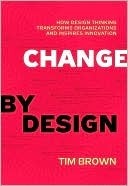More on this book
Community
Kindle Notes & Highlights
by
Tim Brown
Read between
December 7, 2017 - May 12, 2018
attempt to move beyond the sculptural objet displayed in lifestyle magazines or on pedestals in museums of modern art. But this phrase never seemed fully satisfactory. One day I was chatting with my friend David Kelley, a Stanford professor and the founder of IDEO, and he remarked that
Dawdle. Lollygag. First one there’s a rotten egg.”). In collaboration
technology to protect their privacy; patterns of street life in the emerging multinational metropolis; the burgeoning community of people who live in “extreme homes” such as RVs. The psychologists,
Certain themes and variations—techniques of observation, principles of empathy, and efforts to move beyond the individual—can all be thought of as ways of preparing the mind of the design thinker to find insight: from the seemingly commonplace as well as the bizarre, from the rituals of everyday life but also the exceptional interruptions to those rituals, and from the average to the extreme. That insight cannot yet be codified, quantified, or even defined—not yet, at any rate—
relies on synthesis, the collective act of putting the pieces
but an exercise in sustained experimentation—try something new, and see what sticks. It may well
Defer judgment. Encourage wild ideas. Stay focused on the topic. The most important of them, I would argue, is “Build on the ideas of others.” It’s right up there with “Thou shalt not kill” and “Honor thy father and thy mother,” as it ensures that every participant is invested in the last idea put forward and has the chance to move


